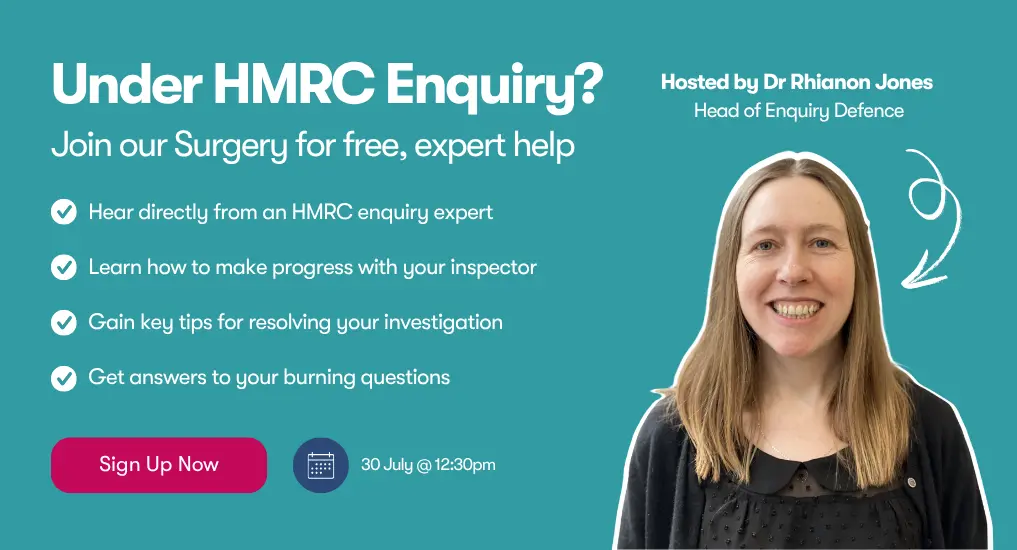An HMRC R&D enquiry – also known as a compliance check – can spell bad news for your business. Here’s what you need to know about how compliance checks work, why you might face one, and how you can avoid them in the future.
HMRC processes the majority of R&D Tax Relief claims without issue. However, a rapidly growing number face what’s called a compliance check.
Compliance checks occur when HMRC is unsure whether some or all of your projects qualify for relief. To decide, the agency asks you to provide further information about your development work. It will ask you to provide this information in writing and, often, on a conference call.
Enquiries can last several months, delaying your funding. They can also damage your relationship with HMRC and reduce your windfall. They’re also time-consuming, especially for your senior financial and technical people.
Now that HMRC is taking a much more thorough approach to compliance, it’s important businesses know what compliance checks are and how to avoid them. This is what I’ve explained in this blog.
If you still have questions about HMRC R&D enquiries after reading this article, just drop us a line. Our R&D Tax Credits experts are always happy to lend a hand.
Contents
What is an HMRC compliance check?
A compliance check or ‘enquiry’ is essentially an investigation into your R&D Tax Relief claim.
They generally happen when the tax inspector reviewing your claim can’t work out whether some aspect of your development work qualifies for funding. A small number enquiries are launched as part of a random sampling programme.
To clear up their concerns, your inspector will write to you with a list of questions designed to collect more financial and technical data about your R&D. Often, they will invite you to present information on a conference call.
Enquiries generally involve multiple rounds of questioning and can take months or sometimes even years to resolve.
But while facing an enquiry can be extremely inconvenient, they are a vital mechanism for protecting the R&D Tax Relief scheme from abusive claims and ensuring that UK taxpayers receive value for money.
Why does HMRC launch enquiries?
HMRC will usually launch an enquiry for one of four reasons:
- Financial discrepancies
- Insufficient proof of eligible R&D
- A jump in claim size
- Random sampling
Let’s look at each of them in more detail.
1. Financial discrepancies
Nothing raises a red flag faster at HMRC than numbers that don’t add up.
If the figures in your additional information form don’t match those in your corporate accounts, there’s a good chance your tax agent will launch an enquiry to clear up the discrepancy.
One example of a this kind of discrepancy would be listing £200,000 worth of subcontractor costs in your additional information form but only £100,000 in your P&L.
Accounting errors aren’t designed to defraud the government. But when it comes to R&D Tax Relief and HMRC, small mistakes can create big problems for your business.
2. Insufficient proof of eligible R&D
To claim R&D Tax Credits, you must prove that your development work satisfies the government’s definition of ‘eligible R&D’.
You do this in the technical section of your additional information form, where you answer questions about scientific and technological advances and uncertainties.
If you fail to prove your eligibility, HMRC will probably launch an enquiry.
One mistake companies commonly make when trying to demonstrate their eligibility is talking about business challenges rather than technical ones. Work resolving business challenges – how to market a new product, for example – is not eligible for relief.
If, during the enquiry, you still can’t demonstrate your project is eligible, HMRC will remove it from your claim. This will significantly reduce your funding.
3. A jump in claim size
A jump in claim size might seem like a strange reason for an enquiry.
The point of R&D Tax Credits is to encourage companies to invest more money in development work. So, why should HMRC penalise businesses for doing just that?
Unfortunately, if your claim size dramatically increases from one year to the next – from £500,000 to over £1,000,000, for example – without sufficient justification, it can make HMRC think that you’ve made a mistake. That you’ve started claiming for ineligible development work, for instance.
The best way to eliminate these suspicions is by explaining the increase in your claim report and by providing that your project’s qualify in your additional information form.
4. Random sampling
HMRC launches a certain number of enquiries at random. It does this through its mandatory random enquiry programme (MREP).
The agency says the programme is designed to “better understand levels of non-compliance”.
MREP recently helped HMRC to uncover that non-compliant claims filed during the 2020 tax year attracted more than £1 billion in funding.
What happens during an HMRC R&D enquiry?
Fundamentally, a compliance check is a back-and-forth with HMRC in which you will provide a range of financial and technical information about your projects in order to address your inspector’s concerns.
What form these questions take varies between enquiries. You might receive everything in writing. Or you might be asked to join a series of conference calls and in-person meetings.
The structure of your enquiry, and how quickly it’s resolved, depends on how effectively you can answer your inspector’s questions.
If you answer their questions accurately and succinctly your enquiry could be over relatively quickly.
But muddy the waters with unclear answers and irrelevant data, and your compliance check could drag on for many months or even years.
This is why, if you’re facing an HMRC R&D enquiry, it’s a good idea to bring in expert help.
GrantTree’s experienced Enquiry Defence team knows exactly what tax inspectors are looking for, meaning they can answer HMRC’s questions quickly, expediting your investigation and minimising disruption to your business.
Now, let’s look at what can happen during an HMRC compliance check.
The letter
All enquiries start with a compliance check letter from HMRC.
This letter will contain a list of questions covering a mixture of financial and technical information.
You will need to respond within 30 days of the letter being generated. So, likely 25-28 days after you receive it.
You will need to collate the required information, including evidence like bank statements and invoices, and send everything back to HMRC.
If your R&D Tax Credits claim has changed since you filed it, you will also need to include an updated filing.
The follow up letter
Unfortunately, very few compliance checks end after you respond to the first letter.
HMRC almost always has additional questions based on your reply. They will either pose these questions in an interview, held in person or virtually, or a follow-up letter.
A follow-up letter will include a list of questions that will unpick or challenge the information you provided after the first.
It will likely explore your team’s job roles relating to R&D. In other words, who did what on your different projects.
Like the initial letter, follow-up correspondence will contain a strict deadline for your response.
The interview
After the first or second letter, HMRC could ask to interview your finance and technical teams to discuss your development work.
This meeting is hosted by an HMRC tax inspector. Though they are free to use internal resources at HMRC to assist them with the more technical aspects of the enquiry.
For example, many software and Dev Ops claims that are enquired see HMRC’s DevOps team (‘CDIO’) brought in to assist the inspector.
Enquiry interviews are not antagonistic, per se. But they can be gruelling.
Over the course of a two-to-three-hour session, HMRC’s inspectors will look to interrogate various aspects of your project, stress-testing their eligibility for the R&D scheme.
During these high-pressure exchanges, it’s easy to create misunderstandings that result in mistrust and cause both sides to double down on their positions.
But while an enquiry interview is a potential banana skin, it’s also your chance to put your enquiry to bed once and for all.
Prepare thoroughly, and work with an Enquiry Defence specialist like GrantTree, and your compliance check could be over soon.
Follow-ups and conclusion
After the interview, HMRC will write to you with their conclusions.
If you’ve successfully defended your claim, the inspector will confirm that your application for R&D Tax Credits can proceed without any reduction in claim size.
But if things have gone awry, your inspector will explain which of your technical work they have disqualified from your claim.
If HMRC is threatening to disqualify some of your development work, you have two choices.
You can challenge HMRC’s decision and request another interview to restate your case. This may result in a larger claim size but will cause further delays.
Or you can accept the decision, accept the smaller claim size, but get your money sooner.
When will I know if my claim is being enquired?
You won’t know for sure that HMRC is launching an enquiry into your R&D Tax Credits claim until you receive the letter mentioned above.
You may receive what’s called a ‘nudge letter’, asking whether your company’s tax affairs are up to date. Nudge letters often precede an enquiry, so if you’re sent one, start making preparations.
Also, if your R&D Tax Credits claim hasn’t been processed after three or four months, and you haven’t heard anything from HMRC, an enquiry letter might be on the way.
If your claim hasn’t been processed after six months, it’s all but certain that you’ll be stuck with a compliance check.
What are the likely outcomes of an HMRC R&D enquiry?
The consequences of an enquiry range from lengthy delays to hefty fines. The outcome for your business depends on how well you fielded HMRC’s questions, the speed of your responses, and of course, the strength of your original R&D Tax Credit claim.
Here is the complete list of possible consequences, alongside what you can do to influence their likelihood.
Delays
No matter what you do, an HMRC compliance check will always delay your R&D Tax Credit claim.
Delays can last anywhere from a few months to more than six years, depending on tax inspector capacity and how long it takes to resolve your enquiry.
This is one of the reasons it’s important to answer HMRC’s questions as quickly and thoroughly as possible.
Lost time
Fielding HMRC’s questions typically takes around 60 hours.
Though, it can take much, much longer. In fact, some companies are forced to respond to many enquiry rounds spanning several years.
If you’re handling your enquiry internally, your senior finance and technical people will almost certainly need to dedicate considerable time to the process.
As experts in their field, the opportunity cost of their time is huge. The hours they’ll spend preparing for and participating in high-pressure technical interviews could be better spent on other, more valuable projects.
Reduced claim size
If you don’t defend your enquiry effectively, HMRC could disqualify legitimate R&D from your claim, reducing your relief or cash credit.
To make matters worse, HMRC has the right to launch enquiries into claims filed up to seven years ago.
If the tax authority decides that any of your previous development work was ineligible for funding, it could ask you to repay funding that you received–and in all probability spent–long ago.
Damaged reputation with HMRC
If your R&D Tax Credits claim is enquired, or worse, found to be inaccurate, it could weaken HMRC’s trust in your company.
Poor trust increases your chances of facing compliance checks in the future and could compel the tax authority to re-examine your previous R&D Tax Credit claims.
This might mean you have to repay large amounts of funding your company received and invested several years ago.
Fines
If HMRC deems that you attempted to defraud the taxpayer in your R&D Tax Relief claim, the tax authority can fine you up to the value of funding you claimed for in your filing.
How can I avoid an HMRC enquiry?
Defending an HMRC compliance check can be difficult, stressful and resource-consuming.
Thankfully, there is a range of steps you can take to reduce your chances of facing an HMRC enquiry and keep your relationship with the tax authority intact.
1. Account for every penny
Go through your claim with a fine-tooth comb and triple-check that all your calculations tally with your P&L, tax computations and CT600.
It’s also a good idea to align the answers to the technical section of your additional information form to the cost of your projects.
For example, if one of your projects was particularly expensive, you should dedicate more time to explaining the technical work involved.
2. Make your inspector's job easy
When writing your technical report, make sure you remember your end-user: the HMRC tax inspector. This means writing your report in such a way that a non-technical person can understand it.
Remember, HMRC needs to understand the problems you encountered and how you solved them. Industry jargon and poorly displayed data will stop them from doing that.
3. Collect the right data
If someone non-technical is writing your technical report (which we wouldn’t recommend), you must equip them with the correct data.
My advice is to make a single member of your technical team – someone directly involved in the R&D – responsible for collecting all the necessary information.
A technical person will be much better placed to identify the industry analyses, development reports and experimental results that will reinforce your company’s claim to R&D Tax Credits.
4. Use an R&D Tax Credits specialist
By far, the simplest and least stressful way to avoid an HMRC compliance check is to work with an R&D Tax Credits specialist like GrantTree.
Our experienced tax and technical experts know the R&D Tax Relief scheme inside and out, meaning we can ensure your claim is fully compliant with all the latest legislation.
We’ll also prepare a watertight technical narrative that justifies your development work’s eligibility in a language that HMRC’s tax inspectors will understand.
Conclusion
HMRC compliance checks are a critical but poorly understood element of the R&D Tax Credit scheme.
So I hope this article has given you a better understanding of how they work, why you might encounter them, and how to avoid them.
If you have any questions about enquiries or want some help with your company’s compliance check, our dedicated team of R&D Tax Credit professionals is here to help.
Just drop us a line, and one of our team will be right with you!






